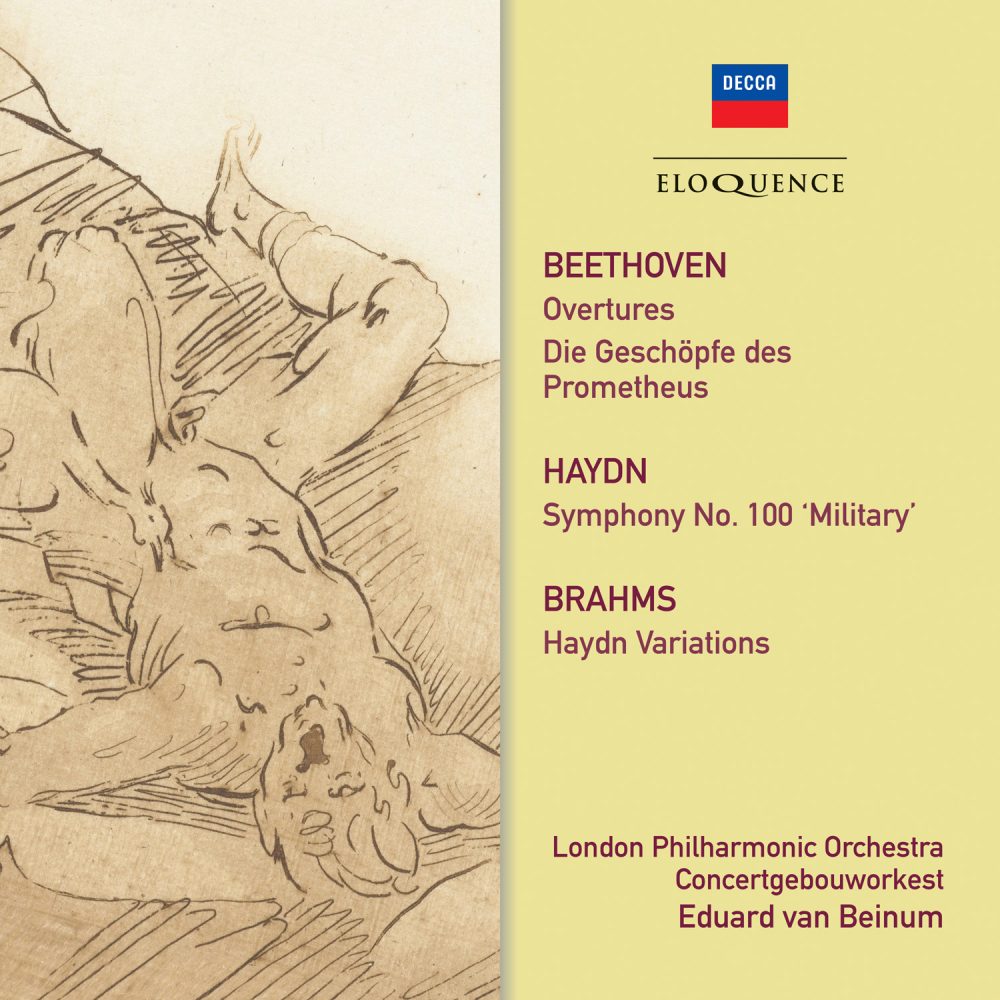A newly remastered collection of Decca and Philips recordings made by under-rated Dutch conductor in Austro-German classics, Eduard van Beinum, including a little-known account of Beethoven’s ‘Prometheus’ Overture.
The ballet music which Beethoven wrote to complement his overture was as little-heard in 1952 as it is now. Eduard van Beinum recorded eight numbers from the complete score, evidently enjoying the lighter side of the composer, as part of a growing and successful relationship with the London Philharmonic Orchestra now documented on Eloquence and complementing the work he did with his band ‘at home’, the Concertgebouw Orchestra of Amsterdam.
As Niek Nelissen’s documentary essay details in the booklet, the LPO musicians were as keenly appreciative of Van Beinum’s unfussily musical good sense as many listeners at home; they noted how he achieved orchestral discipline without resorting to the tactics of contemporary tyrants of the podium and encouraged a natural fluency of phrasing. Under him the overtures ‘Egmont’, ‘Coriolan’, ‘Consecration of the House’, ‘Prometheus’, ‘Fidelio’ and ‘Leonore III’ do not sound like some lesser form of symphonic music but the exciting curtain-raisers Beethoven intended them to be and which put the listener in the mood for a dramatic story. These 1949–52 recordings are complemented by a previous ‘Prometheus’ Overture, set down in Kingsway Hall in November 1946, in the same sessions as an ‘alert and biting statement’ (High Fidelity, November 1952) of the ‘Military’ Symphony by Haydn.
This collection ends with the work that Van Beinum put on record more often than any other composition: the ‘Haydn Variations’ of Brahms. This is the third of his four studio recordings, made with the Concertgebouw in 1952.
CD 1
LUDWIG VAN BEETHOVEN
Overtures*:
Die Geschöpfe des Prometheus, Op. 43 (1946 Recording)
Leonore No. 1, Op. 138
Leonore No. 3, Op. 72b
Fidelio, Op. 72c
Egmont, Op. 84
Coriolan, Op. 62
Die Weihe des Hauses, Op. 124
CD 2
Die Geschöpfe des Prometheus, Op. 43:
Overture and Incidental Music
FRANZ JOSEPH HAYDN
Symphony No. 100 in G major, ‘Military’ H.I:100*
JOHANNES BRAHMS
Variations on a Theme by Haydn (St. Antoni’s Chorale), Op. 56a
London Philharmonic Orchestra (Beethoven, Haydn)
Concertgebouworkest (Brahms)
Eduard van Beinum
*FIRST CD RELEASE ON DECCA
Recording Producers: Victor Olof (Leonore No. 1, Prometheus Overture, Die Weihe des Hauses, Haydn: Symphony No. 100, Haydn Variations); John Culshaw (Leonore No. 3, Fidelio, Egmont, Coriolan, Die Geschöpfe des Prometheus, Brahms: Haydn Variations)
Balance Engineer: Kenneth Wilkinson (Leonore No. 1, Leonore No. 3, Fidelio, Egmont, Coriolan, Die Geschöpfe des Prometheus, Haydn: Symphony No. 100, Brahms: Haydn Variations)
Recording Location: Kingsway Hall, London, UK, 29 November 1946 (Prometheus Overture, Haydn: Symphony No. 100), 3 May 1949 (Leonore No. 1), 11 April 1950 (Die Weihe des Hauses), 25 February 1952 (Leonore No. 3), 27–29 February 1952 (Fidelio, Egmont, Coriolan), 27–29 February & 19 March 1952 (Die Geschöpfe des Prometheus); Grotezaal, Concertgebouw, Amsterdam, The Netherlands, November 1952 (Brahms: Haydn Variations
Remastering Engineer: Chris Bernauer
Original Decca Releases: AK1808–10, first issued July 1949 and LXT2683, first issued June 1952 (Haydn: Symphony No. 100) X311, first issued Mach 1950, unpublished on LP (Leonore No. 1); AX531–32, first issued June 1951 and LW5016, first issued May 1953, then on ACL 97 in 1958 (Die Weihe des Hauses); K23312, first issued c.1952 and LW5015, first issued May 1953, then on ACL 97 in 1958 (Coriolan); K23313, first issued 1952 and LW5018, first issued May 1953, then on ACL 97 in 1958 (Fidelio); LXT2741, first issued November 1952 (Die Geschöpfe des Prometheus); LXT2778, first issued April 1953 (Brahms: Haydn Variations); LW5015, first issued May 1953, then on ACL 97 in 1958 (Egmont); LW 5016, first issued May 1953, then on ACL 97 in 1958 (Leonore No. 3)
Beethoven: Prometheus Overture, 1947 recording, unpublished on 78rpm or LP
‘Van Beinum and the Amsterdam orchestra give a beautifully sensitive performance throughout, considerably more alive than that of Furtwängler.’ Gramophone (Haydn Variations)
‘Van Beinum makes more of the music, gives a more confident and broad-based performance … The recording is excellent throughout … detailed comparison shows that in almost every case the London players are superior.’ Gramophone (Prometheus Ballet)

